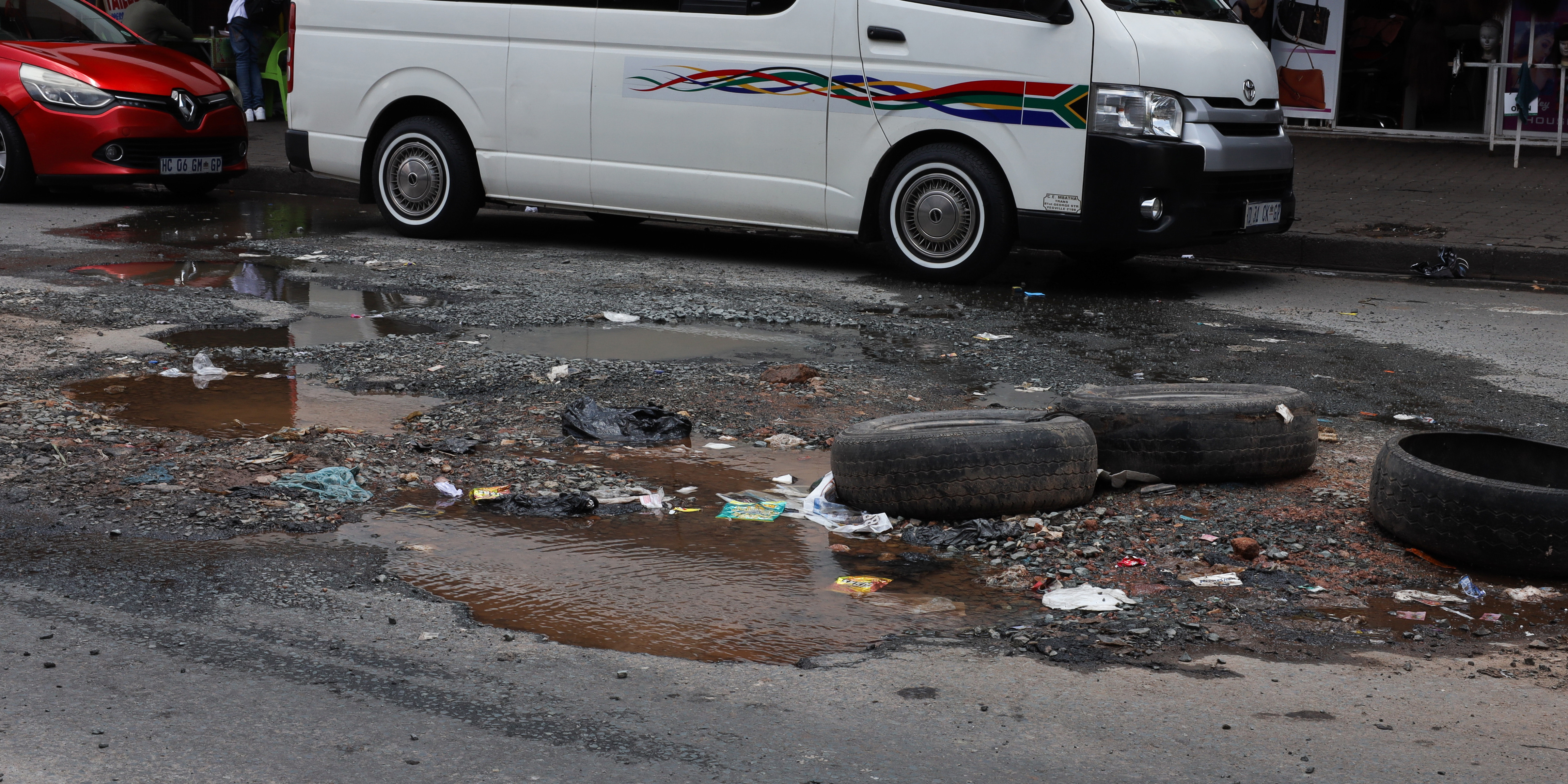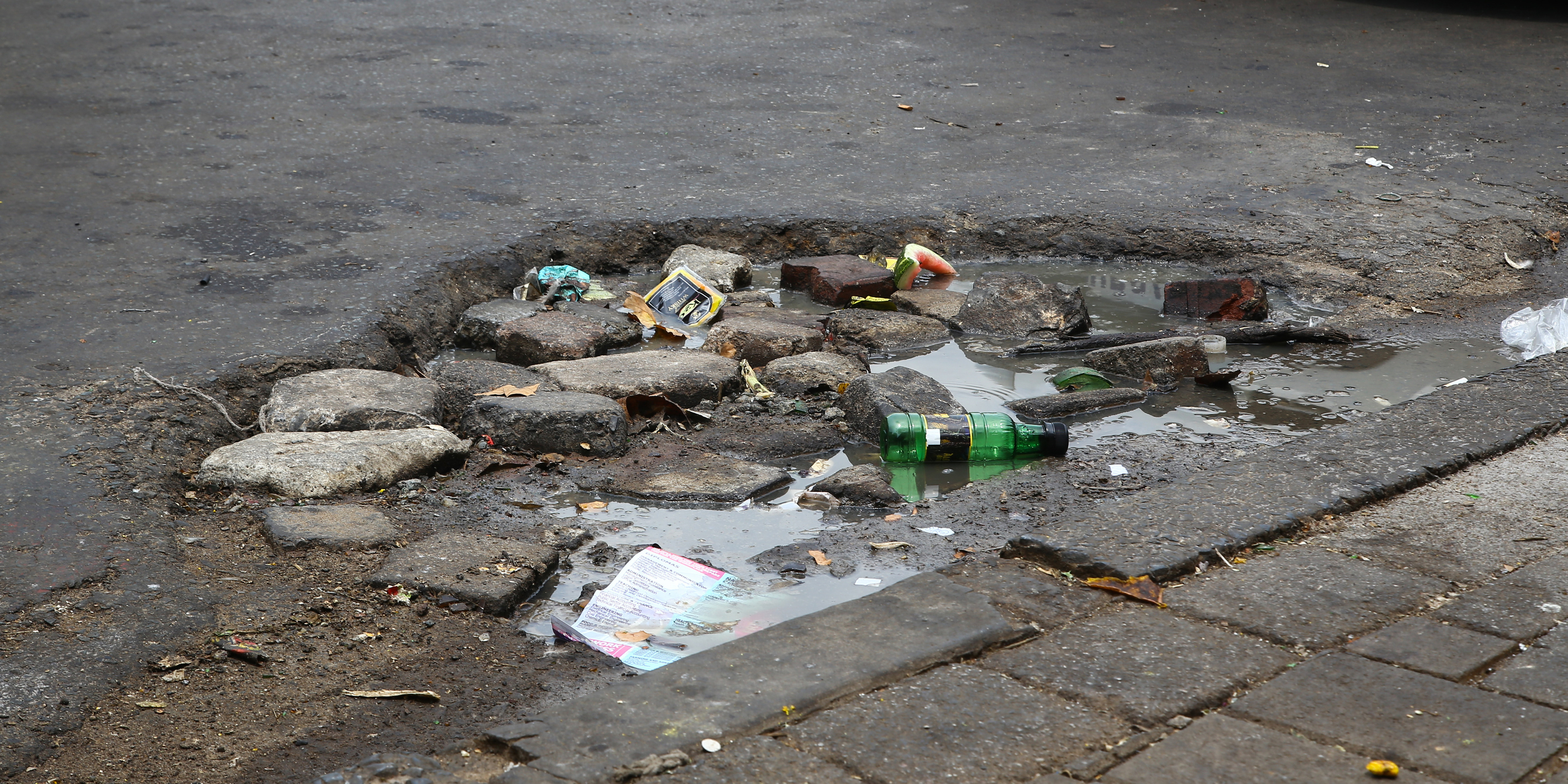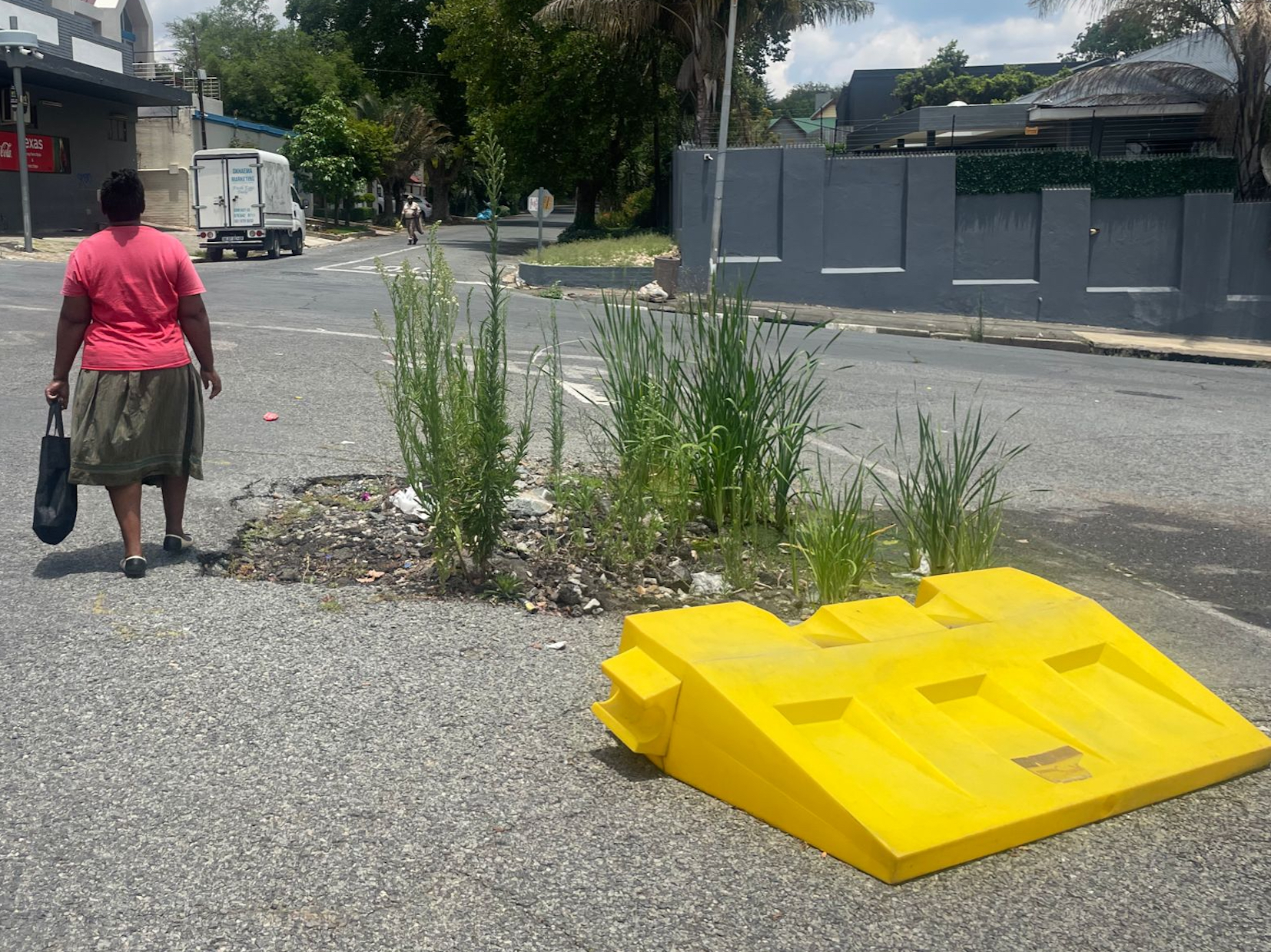Rewilding is gathering pace in my Johannesburg suburb. It’s what nature does when left alone: reclaim areas no longer under human management. That can be a good thing. Rewilding is the method du jour for conservationists trying to restore ecosystems and reverse declines in biodiversity in various parts of the world.
But for a city of six million people, it can become a problem.
Of all the weeds — if that’s what they are — shooting through my neighbourhood’s shattered sidewalks and sinking potholes, the cluster at the bottom of my street is the most impressive. It’s even gone viral on X.
Seven months ago, city workers attempted to fix a broken water pipe that burst in the middle of the street, one of about 140 that reportedly fail each day under the City of Gold. They didn’t succeed, at least not entirely. Water still seeps.
When “done”, the workers heaved some gravel into the pit they dug, placed a yellow plastic road barrier beside it, and left. The city responded to our complaints by saying that it had no money to repair the pothole. That their workers had created it was immaterial.
 Potholes along Lilian Ngoyi Street in Johannesburg on 20 February 2023. (Photo: Gallo Images / Luba Lesolle)
Potholes along Lilian Ngoyi Street in Johannesburg on 20 February 2023. (Photo: Gallo Images / Luba Lesolle)
Fast-forward to the present and one of the weeds growing out of the pothole is about the height of an average NBA basketball player. The others are closing in.
Passersby might assume that our street lets the weeds grow tall in symbolic protest at ANC perfidy and incompetence. Or we’re just lazy.
Perhaps the sadder truth is that we have become indifferent to the never-ending examples of ANC misrule. Not caring is one way to cope with helplessness.
A kingdom of contrasts
There is much talk about this year’s election being a defining moment for the country. One of the newest democratic entrants on the political scene, Rise Msanzi, proclaims: “2024 is our 1994.” No one who believes in integrity and good governance could wish otherwise.
But for all their well-intentioned efforts, new and not-so-new, none look poised to disrupt three decades of ANC dominance this year. “Nationally, their numbers don’t add up,” one of South Africa’s best political economists recently told me. We should all brace for a damp squib.
My street is in one of Johannesburg’s oldest and leafiest areas, affectionately known as “the Parks”. The weedy pothole flourishes in the shadow of one of SA’s great protected trees, a giant cottonwood in our neighbour’s garden, designated a “Champion Tree” by the government. It even has an official name: The Parktown Tree.
Many of us who live in the suburb can retreat from the escalating decay of our public spaces into private gardens that make newcomers to the Parks gape. Such is the colourful riot of plants and trees bequeathed to us by estate planners and residents of the area in the early 20th century. It would be hard to find a starker contrast.
Well, not that hard. Moaning about a weed, when half a million people in your city inhabit shacks, is to live in the kingdom of contrasts. Cognitive dissonance is about the only way our best selves can survive it.
Joburg’s ‘Detroit moment’
Ten years ago, I penned an article with a young colleague from the state of Michigan, asking whether Johannesburg could collapse like Michigan’s biggest city, Detroit.
The famed “Motor City” was once the US’s — some say the world’s — wealthiest city. But in July 2013, Detroit filed the largest municipal bankruptcy in US history. The next day, a raft of mind-boggling statistics emerged. More than 40% of Detroit’s residents lived in poverty; 47% were illiterate. The city was home to nearly 80,000 abandoned buildings. In some neighbourhoods, house after house had been consumed by vines and undergrowth. Nature had taken over.
For Johannesburg, 2013 was a more optimistic time. “Africa’s world-class city”, the “New York of the 21st century”, the economic hub of the Global South — all seemed possible. Yet the governance trajectory was ominous.
 Predatory regimes come and go worldwide, but none have observed their country’s by-far greatest economic engine — let alone the continent’s — break down with such alacrity. (Photo: Gallo Images / Luba Lesolle)
Predatory regimes come and go worldwide, but none have observed their country’s by-far greatest economic engine — let alone the continent’s — break down with such alacrity. (Photo: Gallo Images / Luba Lesolle)
The failures that collapsed Detroit were a warning to Joburg. The historical fabrics of the two cities were similar: both were largely defined by race and, as their nicknames attested, a single industry. There were racially segregated neighbourhoods and poor public schools, abandoned factories and mine dumps.
The Washington Post columnist George Will controversially argued that the people of Detroit got what they deserved: “Well, what did they vote for? For 60 years, they voted for incompetents, malcontents and in some cases, criminals.” His counterpart in South Africa might reach for an even bleaker explanation, Voltaire’s: “It is difficult to free fools from the chains they revere.”
Is that why the ANC thinks it can put such a compromised toady in the Johannesburg mayor’s seat? Or claim that the city’s Municipal Public Accounts Committee is holding corrupt officials accountable, when everyone knows that they can steal with impunity (cases are known to take several years to finalise, by which time the guilty are on to their next gig)?
And yet, why more has not been done by national and provincial leaders to arrest the slide of Johannesburg before its “Detroit moment” arrives can’t be attributed solely to corruption and stupidity. Predatory regimes come and go worldwide, but none have observed their country’s by-far greatest economic engine — let alone the continent’s — break down with such alacrity.
Nothing is so important that it can’t be sacrificed on the altar of ANC politics. The water and sanitation infrastructure in South Africa’s third-largest city, Durban? Nope. Let the beachgoers eat sewage.
The best of us
That Johannesburg doesn’t find itself in an even worse condition is down to the nameless heroes who chip in every day where the state has departed. A friend in the city council tells me that volunteers working for Citizen Relationship and Urban Management, a citizen-led body that is meant to augment the work of city entities and departments, is now doing much of it for them. Cutting grass, sweeping the streets, picking up litter. They are the best of us.
It is their spirit and resilience that might stop Johannesburg from falling into the abyss. But they can’t restore its global pretensions. A city that functions better, is fairer and less unequal, safer and cleaner. That would be ambitious enough.
The storied US public servant and intellectual Daniel Patrick Moynihan once said:
“The central conservative truth is that it is culture, not politics, that determines the success of a society. The central liberal truth is that politics can change a culture and save it from itself.”
Many remarkable South Africans are trying to fix the country’s rotten politics. Perhaps they’ll put a bigger dent in the ANC than I imagine. But so long as the party’s biggest asset, the President, escapes blame for this omnishambles, “1994” won’t happen till (at least) 2029.
Either way, nature doesn’t care. It just is.
Some years ago, when tiny shothole borer beetles started wreaking havoc in the Parks, fatally infecting many of the area’s majestic plane and oak trees with their fungus, I assumed that the Parktown Tree was also a goner.
Each passing year, its leaves browned and fell earlier than normal, so it seemed. But the old cottonwood is still standing. Curiously, it’s looking stronger than ever. DM
Dr Terence McNamee is a Non-Resident Global Fellow of the Wilson Center (Washington, DC).




 The streets of Johannesburg are paved with litter, not gold. (Photo: Gallo Images / Luba Lesolle)
The streets of Johannesburg are paved with litter, not gold. (Photo: Gallo Images / Luba Lesolle)